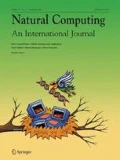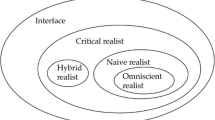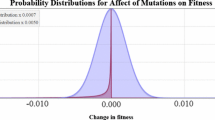Abstract
There is no doubt that both determining theoretical properties and characterizing the observed behavior of an evolutionary algorithm allow us to understand when to use such an algorithm in solving a class of optimization problems. One of those evolutionary algorithms is the Hybrid Adaptive Evolutionary Algorithm (haea). The general scheme followed by a haea algorithm is to evolve every individual of the population by selecting genetic operators according to a kind of chaotic competition mechanism. This paper proposes and studies, from both theoretical and experimental points of view, the class of hybrid adaptive evolutionary algorithms (called chavela), i.e., the class of evolutionary algorithms that follow such a general scheme. In this way, this paper presents a formal characterization of the chavela class in terms of Markov kernels; establishes convergence properties; proves that (parallel) hill-climbing algorithms belong to the chavela class; develops generational, steady-state, and classic versions; and analyzes the running behavior of chavela on well-known optimization functions.















Similar content being viewed by others
References
Beyer HG, Schwefel HP (2002) Evolution strategies—a comprehensive introduction. Nat Comput 1:3–52. https://doi.org/10.1023/A:1015059928466
Bowerman BL (1974) Nonstationary markov decision processes and related topics in nonstationary markov chains. Ph.D thesis, University of Iowa, https://lib.dr.iastate.edu/rtd/6327
Breiman L (1968) Probability. Addison-Wesley, Cambridge
Cantor G, Gómez J (2010) Maintaining genetic diversity in fine-grained parallel genetic algorithms by combining cellular automata, cambrian explosions and massive extinctions. In: IEEE Congress on Evolutionary Computation
Cruz-Salinas AF, Gomez J (2017) Self-adaptation of genetic operators through genetic programming techniques. In: Proceedings of the Genetic and Evolutionary Computation Conference, Association for Computing Machinery, New York, NY, USA, GECCO ’17, p 913–920, https://doi.org/10.1145/3071178.3071214,
Cubides E, Gomez J (2020) Obtaining basic algebra formulas with genetic programming and functional rewriting. submitted to arXiv
De Jong K (1975) An analysis of the Behavior of a class of genetic adaptive systems. Ph.D thesis, University of Michigan
Drake JH, Kheiri A, Özcan E, Burke EK (2020) Recent advances in selection hyper-heuristics. Euro J Oper Res 285(2):405–428. https://doi.org/10.1016/j.ejor.2019.07.073
Eiben AE, Hinterding R, Michalewicz Z (1999) Parameter control in evolutionary algorithms. IEEE Trans Evolut Comput 3(2):124–141
Forrest S, Mitchell M (1993) Relative building blocks fitness and the building block hypothesis. Foundations of Genetic Algorithms (2)
Fristedt BE, Gray LF (1997) A modern approach to probability theory. Springer, Berlin
Goldberg D, Korb B, Deb K (1989) Messy genetic algorithms: motivation, analysis, and first results. Complex Syst 3:493–530
Gomez J (2004) Evolution of fuzzy rule based classifiers. In: Proceedings of the Genetic and Evolutionary Computation Conference GECCO 2004
Gomez J (2004) Self adaptation of operator rates for multimodal optimization. In: Proceedings of the 2004 Congress on Evolutionary Computation (IEEE Cat. No.04TH8753), vol 2, pp 1720–1726
Gomez J (2004) Self adaptation of operator rates in evolutionary algorithms. In: Proceedings of the Genetic and Evolutionary Computation Conference (GECCO 2004)
Gomez J (2006) An incremental-evolutionary approach for learning deterministic finite automata. In: 2006 IEEE International Conference on Evolutionary Computation, pp 362–369, https://doi.org/10.1109/CEC.2006.1688331
Gomez J (2019) Stochastic global optimization algorithms: a systematic formal approach. Inf Sci 472:53–76. https://doi.org/10.1016/j.ins.2018.09.021
Gomez J, Kozma R (2004) Fuzzy class binarization using coupled map lattices. In: Proceedings of North American Fuzzy Information Processing Society NAFIPS 2004
Gomez J, Leon E (2010) A coevolutionary chromosome encoding scheme for high dimensional search spaces. In: IEEE Congress on Evolutionary Computation, https://doi.org/10.1109/CEC.2010.5586359
Gomez J, Rivera C (2020) Non-stationary stochastic global optimization algorithms. Submitted-to-Natural- Computation,-available-on- arXiv
Gomez J, Garcia A, Silva C (2005) Cofre: a fuzzy rule coevolutionary approach for multiclass classification problems. In: 2005 IEEE Congress on Evolutionary Computation, vol 2, pp 1637–1644, https://doi.org/10.1109/CEC.2005.1554885
Holland JH (1975) Adaptation in natural and artificial systems. The University of Michigan Press, Michigan
Karafotias G, Hoogendoorn M, Eiben AE (2015) Parameter control in evolutionary algorithms: trends and challenges. IEEE Trans. Evol Comput 19(2):167–187
Kenkle A (2014) probability theory: a comprehensive course, 2nd edn. Springer, Berlin
Kimura M (1983) The neutral theory of molecular evolution. Cambridge University Press, Cambridge
Leon E (2005) Scalable and adaptive evolutionary clustering for noisy and dynamic data. Ph.D thesis, USA
Leon E, Nasraoui O, Gomez J (2006) Ecsago: Evolutionary clustering with self adaptive genetic operators. In: 2006 IEEE International Conference on Evolutionary Computation, pp 1768–1775
Leon E, Nasraoui O, Gomez J (2010) Scalable evolutionary clustering algorithm with self adaptive genetic operators. In: IEEE Congress on Evolutionary Computation, https://doi.org/10.1109/CEC.2010.5586467
Liberti L (2004) Introduction to global optimization. Monographs of the Sociedad Matematica Peruana
Mahfoud SW (1995) A comparison of parallel and sequential niching methods. In: Proceedings of the Sixth International Conference on Genetic Algorithms
Mitchell M (1996) An introduction to genetic algorithms. MIT Press, Cambridge
Nader-Palacio D, Rodríguez-Cárdenas D, Gomez J (2018) Assessing single-objective performance convergence and time complexity for refactoring detection. In: Proceedings of the Genetic and Evolutionary Computation Conference Companion, Association for Computing Machinery, New York, NY, USA, GECCO ’18, p 1606–1613, https://doi.org/10.1145/3205651.3208294,
Nasraoui O, Leon E, Krishnapuram R (2005) Unsupervised Niche Clustering: Discovering an Unknown Number of Clusters in Noisy Data Sets, pp 157–188. https://doi.org/10.1007/3-540-32358-9_8
Prieto J, Gomez J (2020) Hybrid adaptive evolutionary algorithm for multi-objective optimization. arXiv:2004.13925
Prieto J, León E, Garzon MH (2018) Self-adaptive evolutionary algorithm for DNA codeword design. 2018 IEEE Congress on Evolutionary Computation (CEC) pp 1–8
Prieto J, Gomez J, Leon E (2019) Multi-objective evolutionary algorithm for DNA codeword design. In: Proceedings of the Genetic and Evolutionary Computation Conference, Association for Computing Machinery, New York, NY, USA, GECCO ’19, p 604–611, https://doi.org/10.1145/3321707.3321855
Puerta-Jaramillo DL (2016) An evolutionary approach for the optimization of production-distribution network design. Master’s thesis, Universidad Nacional de Colombia-Sede Bogotá, http://bdigital.unal.edu.co/56372/, magister In Computer And Systems Engineering. Línea de Investigación: Evolutionary Algorithms
Quiñones TAR (2014) Solución de problemas tipo flow-shop mediante algoritmos evolutivos. Master’s thesis, Universidad Nacional de Colombia, http://bdigital.unal.edu.co/12916/, maestría en Ingeniería Industrial. Línea de investigación Algoritmos Evolutivos
Rangaiah GP, Rangaiah GP (2010) Stochastic global optimization techniques and applications in chemical engineering: techniques and applications in chemical engineering. World Scientific Publishing Co., Inc., River Edge
Rudolph G (1996) Convergence of evolutionary algorithms in general search spaces. In: Proceedings of the Third IEEE Conference on Evolutionary Computation, IEEE Press, Piscataway (NJ, pp 50–54
Russell S, Norvig P (2009) Artificial intelligence: a modern approach, 3rd edn. Prentice Hall Press, Upper Saddle River
Schwefel HP (1981) Numerical optimization of computer models. Wiley, New York
Simoes A, Costa E (1999) Transposition: a biologically inspired mechanism to use with genetic algorithms. In: Fourth International Conference on Neural Networks and Genetic Algorithms, pp 612–619
Stewart TJ, Ittmann HW (1979) Two-stage optimization in a transportation problem. J. Oper. Res. Soc. 30(10):897–904
Whitley D, Rana S, Dzubera J, Mathias KE (1996) Evaluating evolutionary algorithms. Artif Intell 85(1–2):245–276. https://doi.org/10.1016/0004-3702(95)00124-7
Zhigljavsky A, Zilinskas A (2010) Stochastic global optimization. Springer Optimization and Its Applications, Springer, http://opac.inria.fr/record=b1132570
Author information
Authors and Affiliations
Corresponding author
Additional information
Publisher's Note
Springer Nature remains neutral with regard to jurisdictional claims in published maps and institutional affiliations.
Rights and permissions
About this article
Cite this article
Gómez, J., León, E. On the class of hybrid adaptive evolutionary algorithms (chavela). Nat Comput 20, 377–394 (2021). https://doi.org/10.1007/s11047-021-09843-5
Accepted:
Published:
Issue Date:
DOI: https://doi.org/10.1007/s11047-021-09843-5
Keywords
- Evolutionary algorithms
- Probabilities adaptation
- Non-stationary Markov Kernel
- Convergence and behaviour analysis




